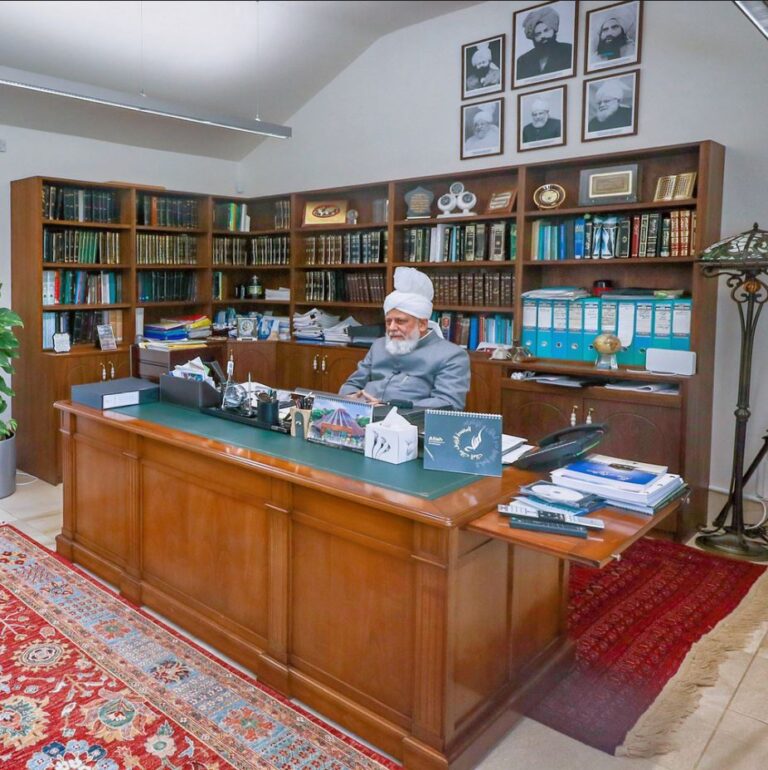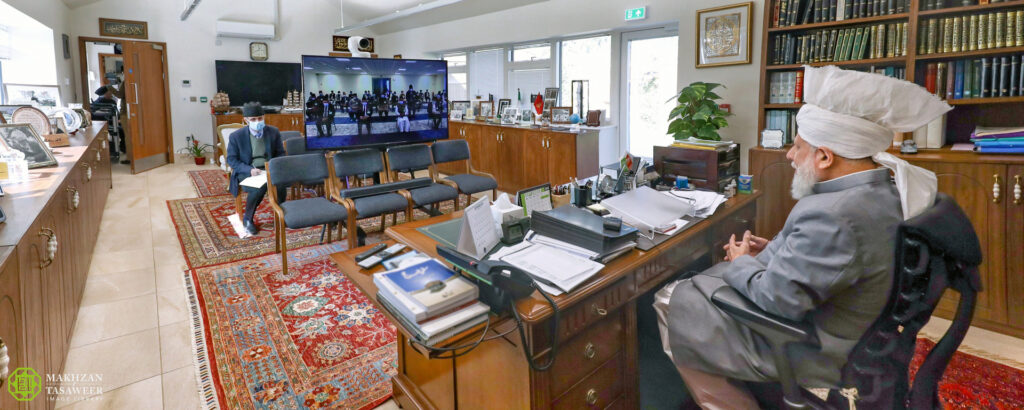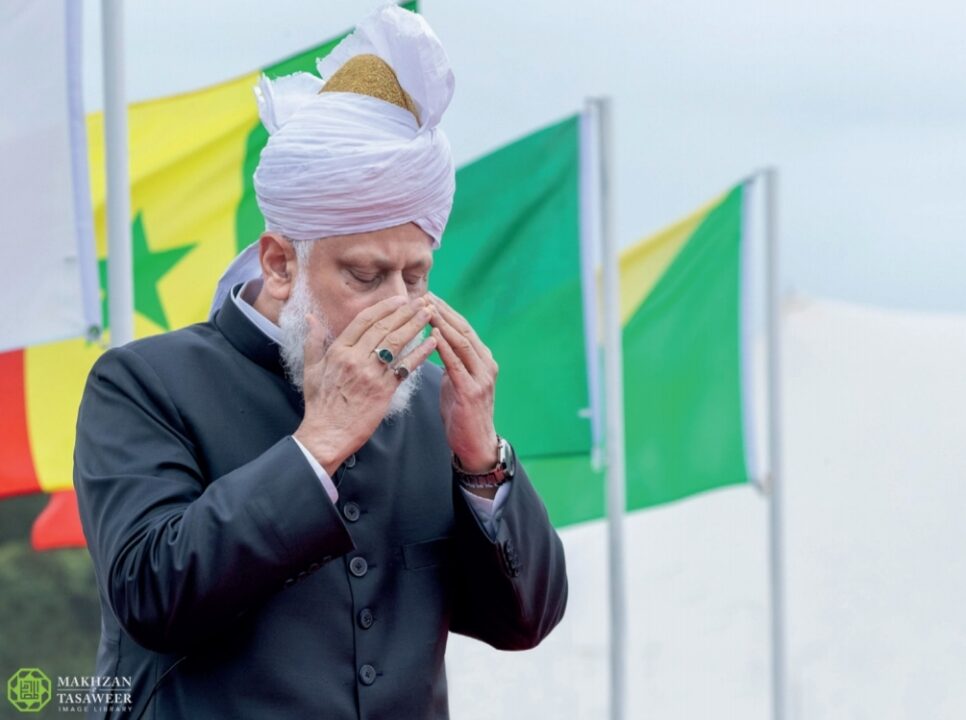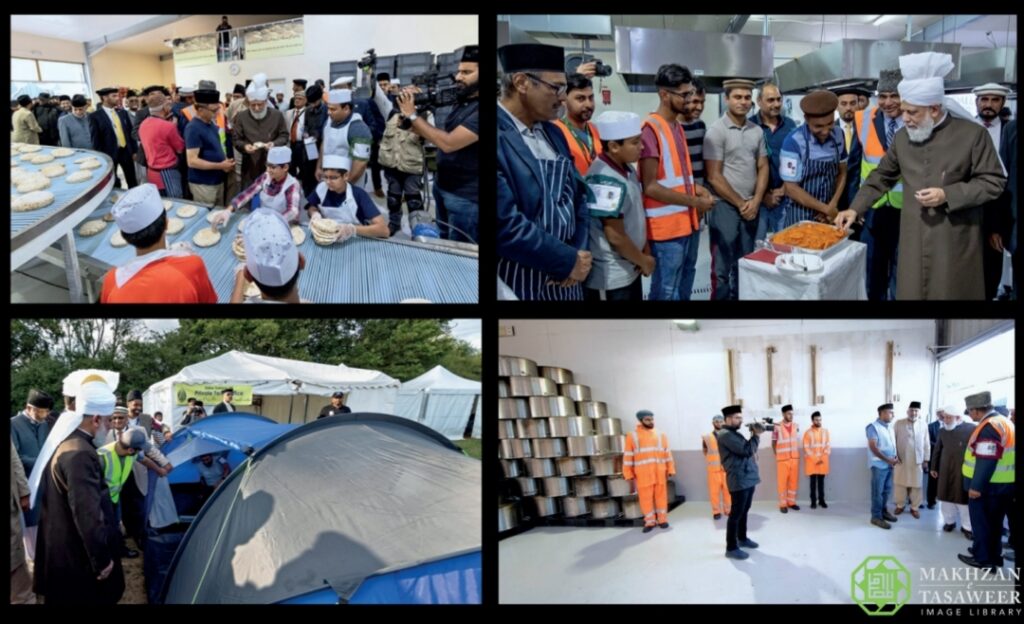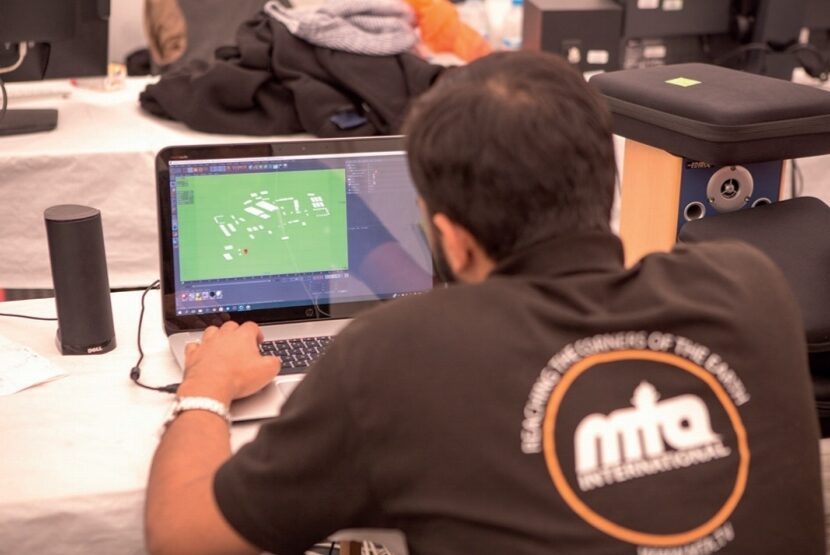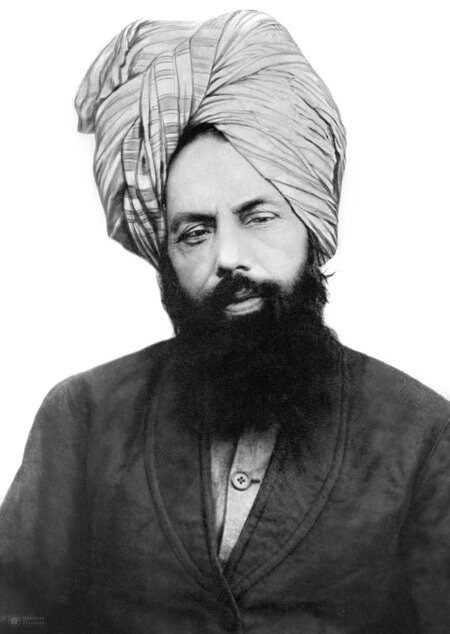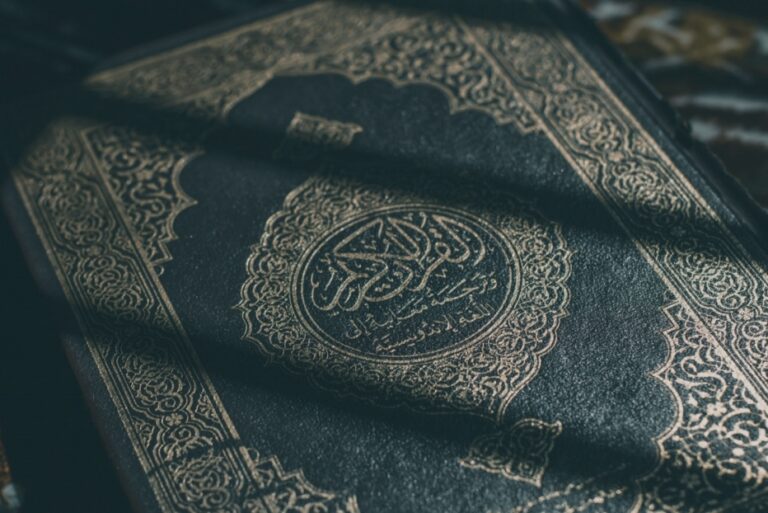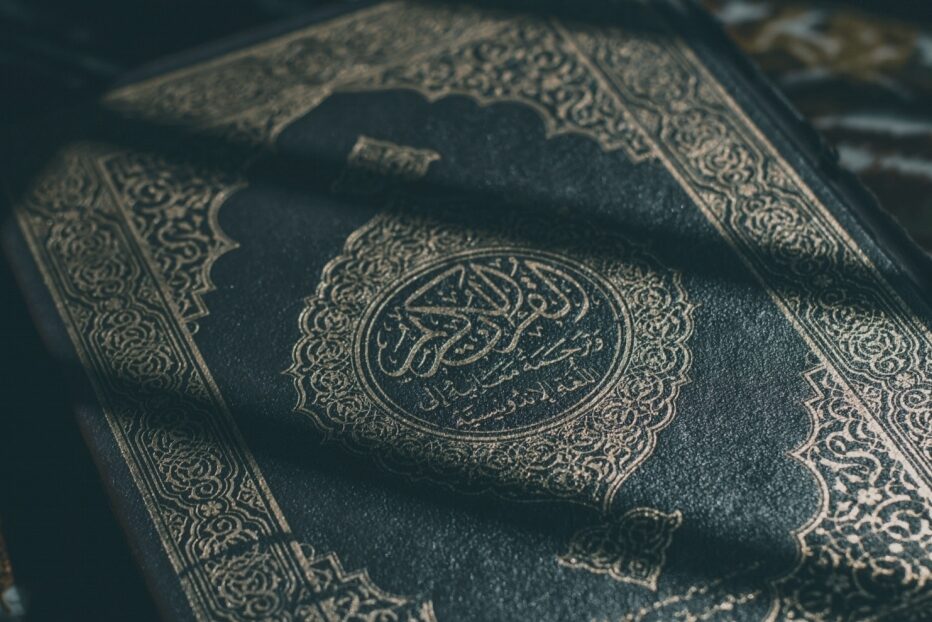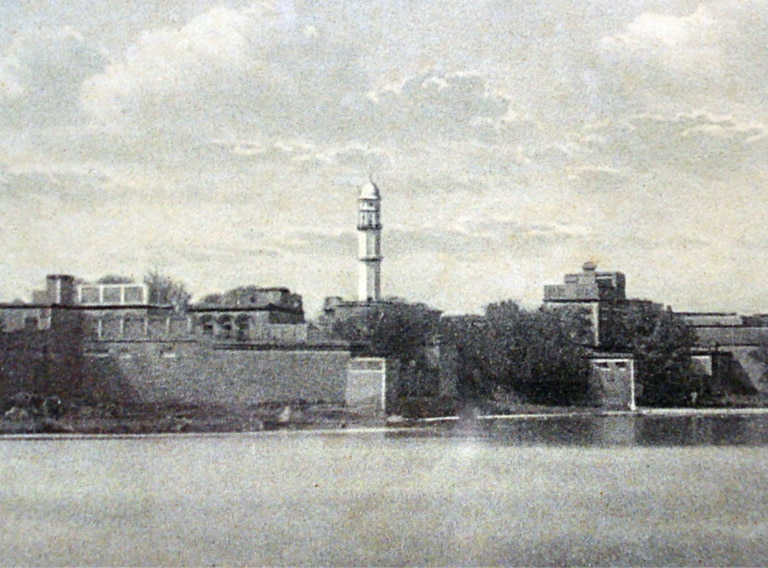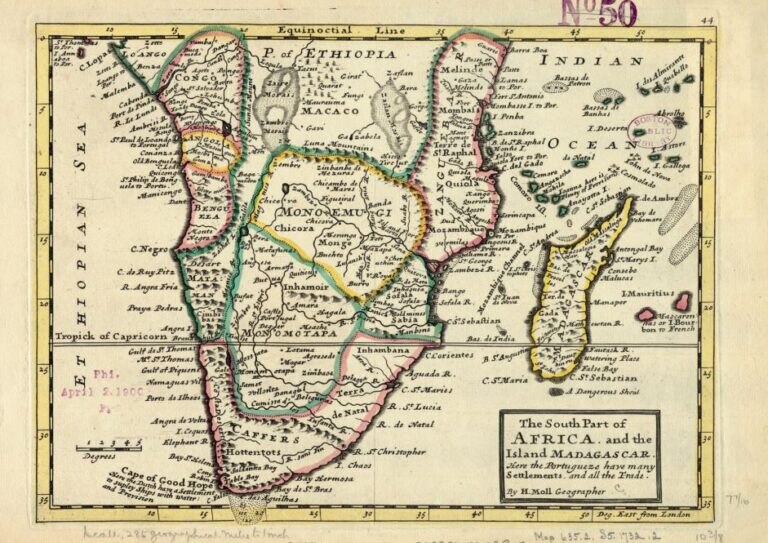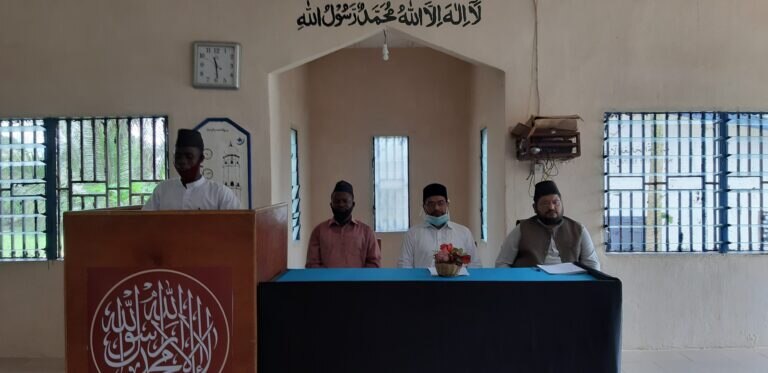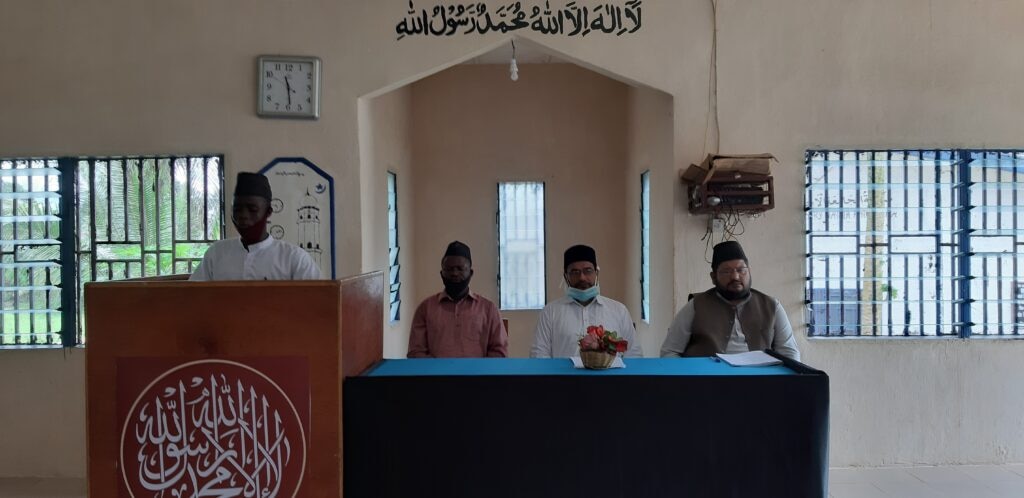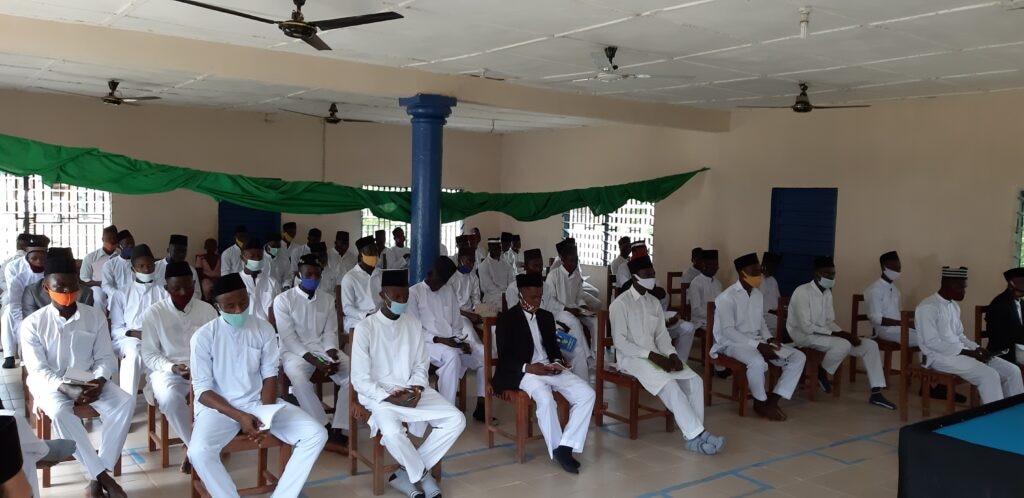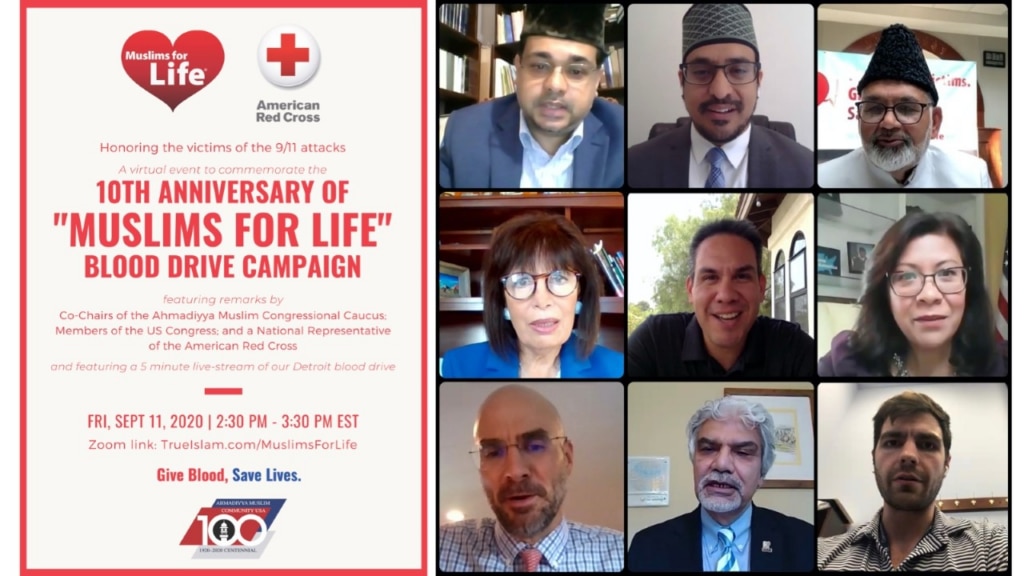Friday Sermon
11 September 2020
Men of Excellence

After reciting the Tashahud, Ta‘awuz, and Surah al-Fatihah, Hazrat Khalifatul Masih Vaa said:
The Badri companion [those companions who took part in the Battle of Badr] whose accounts I shall narrate today is Hazrat Bilalra bin Rabah.
Hazrat Bilal’sra father’s name was Rabah and his mother’s name was Hamamah. Hazrat Bilalra was a slave of Umaiyyah bin Khalaf. Hazrat Bilal’sra title was Abu Abdillah. However, according to other narrations, it is also mentioned as Abu Abdir Rahman, Abu Abdil Karim and Abu Amr. Hazrat Bilal’sra mother was from Abyssinia while his father was from Arabia.
Historians have written that he was of Abyssinian Semite descent. In ancient times, certain Semitic or some Arab tribes migrated to Africa and settled there. Due to this, the complexion of their offspring resembled the natives of that region, but the specific characteristics and habits that are found in the people of that region were not adopted by them. Later on, some of them returned to Arabia as slaves. Since they were of a dark complexion, the Arabs used to think of them as Habshi i.e. people of Abyssinia.
According to one narration, Hazrat Bilalra was born in Mecca and was among the muwallideen. Those who were not of a purely Arab descent used to be referred to as muwallideen. According to another narration, he was born in Surat, situated close to Yemen and Abyssinia where many mixed-race people lived. (Ibn Saad, Al-Tabaqat al-Kubra, Vol. 3, Bilal bin Rabah [Beirut, Lebanon: Dar al-Kutub al-Ilmiyyah, 2017] 174-175) (Ali Ibn al-Athir, Usd al-Ghabah fi Ma‘rifat al-Sahabah, Vol. 1, Bilal bin Rabah [Beirut, Lebanon: Dar al-Kutub al-Ilmiyyah, 2008] 415) (Roshan Satarey az Ghulam Bari Saif Sahib, Vol. 1, p. 145) (Ali Ibn al-Athir, Usd al-Ghabah fi Ma’rifat al-Sahabah [Mutarjam] Vol. 1 [Maktabah Khalil] 283)
Hazrat Bilalra was of a dark-brown complexion. He was thin, had thick hair and had a slender face. (Roshan Satarey az Ghulam Bari Saif Sahib, Vol. 1, p. 145)
Hazrat Bilalra married several times. Some of his wives belonged to very noble families of Arabia. One of his wives’ name was Halah bint Auf, who was the sister of Hazrat Abdur Rahmanra bin Auf. Another wife’s name was Hind Khaulaniyah. The Holy Prophetsa also married Hazrat Bilalra into the tribe of Banu Abi Bukair. Hazrat Bilalra was also related to the family of Hazrat Abu Dardaara through marriage. However, there were no children from any of these wives. (Sheikh Shah Moinuddin Ahmad Nadvi, Siyar al-Sahabah, Vol. 2, Bilal bin Rabah [Karachi, Pakistan: Dar al-Isha‘ah, 2004] 159) (Ibn Hajar al-Asqalani, Al-Isabah fi Tamyiz al-Sahabah, Vol. 8, Halah bint Auf [Beirut, Lebanon: Dar al-Kutub al-Ilmiyyah, 2005] 339) (Ibn Asakir, Tahdhib Tarikh Dimashq al-Kabir,Vol. 10, Dhikr min Ismih Bilal bin Rabah [Beriut, Lebanon: Da Ihya al-Turah al-’Arabi, 2001] 334)
Hazrat Bilalra had a brother whose name was Khalid and a sister whose name was Ghufairah. (Ali Ibn al-Athir, Usd al-Ghabah fi Ma‘rifat al-Sahabah, Vol. 1, Bilal bin Rabah [Beirut, Lebanon: Dar al-Kutub al-‘Ilmiyyah, 2016] 418)
The Holy Prophetsa stated, “Bilal is سَابِقُ الْحَبَشَة i.e. the foremost believer from among the Abyssinians.” (Ibn Saad, Al-Tabaqat al-Kubra, Vol. 3, Bilal bin Rabah [Beirut, Lebanon: Dar al-Kutub al-Ilmiyyah, 2017] 175)
Hazrat Anasra narrates that the Messengersa of Allah said, “There are four people who have taken the lead in accepting Islam. أَنَا سَابِقُ الْعَرَبِ (i.e. I am the foremost believer from among the Arabs.) سَلْمَانُ سَابِقُ الْفُرْسِ (i.e. Salman is the foremost believer from among the Persians.) بِلَالٌ سَابِقُ الْحَبَشَةِ (i.e. Bilal is the foremost believer from among the Abyssinians.) صُهَيْبٌ سَابِقُ الرُّوْمِ (i.e. Suhaib is the foremost believer from among the Romans.)” (Shamsuddin adh-Dhahabi, Siyar A‘lam al-Nubala, Vol. 1, Bilal bin Rabah [Beirut, Lebanon: Mu‘assisat al-Risalah, 2014] 349)
Urwah bin Zubair narrates that Hazrat Bilalra bin Rabah was amongst those individuals, who were considered amongst the weak members of society. When he accepted Islam, he was persecuted so that he may turn back from his faith. However, not once did he utter such words which they desired to hear from him that is to deny belief in Allah the Almighty. Umaiyyah bin Khalaf would punish him. (Ibn Saad, Al-Tabaqat al-Kubra, Vol. 3, Bilal bin Rabah [Beirut, Lebanon: Dar al-Kutub al-Ilmiyyah, 2017] 175)
When Hazrat Bilalra accepted the Holy Prophetsa, he was persecuted through different means. When people would intensify their punishment against Hazrat Bilalra, he would say, “Ahad, Ahad” [i.e. God is one, God is one]. His tormentors would tell him to repeat as they did but in reply, Hazrat Bilalra would say, “My tongue cannot utter such a thing.” According to another narration, when the mushrikeen [idolaters] would punish him so that they could deter him away from his belief, Hazrat Bilalra would respond by saying, “Allah, Allah.” (Ibn Saad, Al-Tabaqat al-Kubra, Vol. 3, Bilal bin Rabah [Beirut, Lebanon: Dar Ihya al-Turath al-‘Arabi, 2017] 175) (Ali Ibn al-Athir, Usd al-Ghabah fi Ma‘rifat al-Sahabah, Vol. 1, Bilal bin Rabah [Beirut, Lebanon: Dar al-Fikr, 2003] 283)
In one narration, it is mentioned that when Hazrat Bilalra became a Muslim, his masters took hold of him and laid him on the ground and placed stones and cow skin on him and said, “Your gods are Lat and Uzza [names of idols]”. However, Hazrat Bilalra would only repeat, “Ahad, Ahad [God is One, God is One]”. Hazrat Abu Bakrra approached his masters and said, “For how long will you continue to torment this man?” Hazrat Abu Bakrra paid seven auqiyah for Hazrat Bilalra and freed him. One auqiyah is equivalent to 40 dirham; that is, he paid 280 dirhams for him. Thereafter, Hazrat Abu Bakrra narrated this incident to the Holy Prophetsa, upon which the Holy Prophetsa said, “O Abu Bakr! Include me in this deed as well.” Hazrat Abu Bakrra replied, “O Prophetsa of Allah! I have already freed him.” (Ibn Saad, Al-Tabaqat al-Kubra, Vol. 3, Bilal bin Rabah [Beirut, Lebanon: Dar al-Kutub al-‘Ilmiyyah, 2017] 175) (Waheed al-Zaman, Lughat al-Hadith, Vol. 4 [Lahore, Pakistan: Ali Asif Printers, 2002] 527)
Hazrat Abu Bakrra bought Hazrat Bilalra and freed him for the sake of Allah. With regard to the purchase, as has previously been mentioned, Hazrat Abu Bakrra paid 280 dirhams. According to some narrations, Hazrat Abu Bakrra bought him for five auqiyah i.e. for 200 dirhams. According to some other narrations, he bought him for seven auqiyah i.e. 280 dirhams and according to yet other narrations, for nine auqiyah i.e. 360 dirhams. (Ali Ibn al-Athir, Usd al-Ghabah fi Ma‘rifat al-Sahabah, Vol. 1, Bilal bin Rabah [Beirut, Lebanon: Dar al-Kutub al-Ilmiyyah, 2016] 415)
In one narration it is mentioned that when Hazrat Abu Bakrra bought Hazrat Bilalra, he was lying under a pile of rocks and Hazrat Abu Bakrra purchased him in exchange for five auqiyah of gold. Upon this, people said to Hazrat Abu Bakrra that they would have sold him even if he were willing to give only one auqiyah i.e. 40 dirhams. In response to this, Hazrat Abu Bakrra said, “Even if you would have been willing to sell him for a hundred auqiyah i.e. 4,000 dirhams, I would have bought him for that price.” (Shamsuddin adh-Dhahabi, Siyar A‘lam al-Nubala, Vol. 1, Bilal bin Rabah [Beirut, Lebanon: Mu’assisat al-Risalah, 2014] 353)
Hazrat Aishara relates that Hazrat Abu Bakrra freed seven such slaves, who were being oppressed. Hazrat Bilalra and Hazrat Amirra bin Fuhaira were among them. (Hakim al-Nishapuri, Al-Mustadrak ala al-Sahihain, Vol. 3, Dhikr Bilal bin Rabah, [Beirut, Lebanon: Dar al-Kutub al-Ilmiyyah] 321)
Hazrat Jabir bin Abdillah relates that Hazrat Umarra used to say, “Hazrat Abu Bakrra is our leader and he has freed our chief i.e. Bilal.” (Sahih al-Bukhari, Kitab Fada‘il Ashab al-Nabisa, Bab Manaqib Bilal bin Rabah Maula Abi Bakr, Hadith 3754)
Mentioning the punishment inflicted upon Hazrat Bilalra and the incident of Hazrat Abu Bakrra freeing him, Hazrat Khalifatul Masih IIra states:
“The slaves who accepted the Holy Prophetsa belonged to various nations. There were Abyssinians such as Bilalra and Romans such as Sohaibra. There were Christians such as Jubairra and Sohaibra and idolaters such as Bilalra and Ammarra.
“Bilal’sra master would make him lie on burning sand and either place rocks on him, or have boys jump on his chest. Bilalra, who was of Abyssinian descent, was the slave of Umaiyyah bin Khalaf, a Meccan chief. Umaiyyah would take him outside of Mecca at noon, under the hot sun, make him lie down naked on the burning sand, place heavy rocks on his chest and say that accept the divinity of Lat and Uzza and renounce Muhammadsa! In reply, Bilalra would say, ‘Ahad, Ahad’. That is, ‘God is One, God is One.’ Repeatedly hearing this response enraged Umaiyyah even further. He would tie a rope around Bilal’sra neck, hand him over to deviant individuals and tell them to drag him across the stones in the streets of Mecca. As a result of this, his body would be covered in blood, but he carried on saying, ‘Ahad, Ahad’. That is, ‘God is One, God is One.’ After a while, when God the Exalted granted the Muslims peace in Medina and they were able to worship freely, the Holy Prophetsa appointed Bilalra to call the Azan [call for prayer]. When this Abyssinian slave would say as-hadu an la ilaha illallahu instead of ash-hadu an la ilaha illallahu [I bear witness that there is none worthy of worship except Allah] during the Azan, the people of Medina, who were not aware of his circumstances, would start laughing.
“Once, when the Holy Prophetsa saw the people of Medina laughing at Hazrat Bilal’sra Azan, he turned to them and said, ‘You laugh while Bilalra calls the Azan but God hears his Azan in the heavens and is pleased.’ The Holy Prophetsa was indicating towards the fact that all they saw was that Bilalra was unable to pronounce the [Arabic letter] sheen, but what value is there in a mere sheen or [Arabic letter] seen. God Almighty knows that when he was made to lay on burning sand with his bare back, and those treacherous people would stomp on his chest with their shoes and would ask whether or not he had learned his lesson, he would respond in his broken [Arabic] language and announce his continued belief in the Unity of God Almighty by saying ‘Ahad! Ahad!’ [God is One, God is one], thus proving his dedication, his belief in the Unity of God and his resoluteness of heart. Thus, his ‘as-hadu’ was of much greater value than the ‘ash-hadu’ of many people.
“When Hazrat Abu Bakrra saw how cruelly Hazrat Bilalra was being treated, he paid his master and freed him. Similarly, there were many slaves whom Hazrat Abu Bakrra freed through his wealth.” (Dibacha Tafsir-ul-Quran, Anwar-ul-Ulum, Vol. 20, pp. 193-194)
Hazrat Bilalra is among the foremost believers; he accepted Islam at a time when only seven people had announced their acceptance. (Ibn Saad, Al-Tabaqat al-Kubra, Vol. 3, Bilal bin Rabah [Beirut, Lebanon: Dar al-Kutub al-‘Ilmiyyah, 2017] 176)
Hazrat Abdullahra bin Masud narrates there were seven people who initially announced their acceptance of Islam; the Holy Prophetsa, Abu Bakrra, Ammarra and his mother Sumayyahra, Suhaibra, Bilalra and Miqdadra. It is narrated that Allah the Almighty kept the Holy Prophetsa safe by way of his uncle, Abu Talib, and kept Hazrat Abu Bakrra by way of his people – as I mentioned in a previous sermon, the Holy Prophetsa was not exempt from the hardships afflicted by the opponents, nor could Hazrat Abu Bakr’sra people keep him safe from their cruelties. Both were also made to endure extreme cruelties. There was some leniency in the beginning, but there were great hardships later on. In any case, this is the account of the narrator; he says that they both had someone to support them – someone who would speak up for them. However the others who were weak or slaves fell victim to the disbelievers. They would be chained in iron shackles and burned in the sun. There was none among them who did not eventually give in to what the disbelievers sought to hear, except for Bilalra. In the cause of Allah, his own being held no significance to him. It was Hazrat Bilalra who always remained steadfast. He was also considered insignificant by his nation, so they would grab him and hand him over to the youngsters, who would drag him around the valleys of Mecca, and all the while, Bilalra would continue saying “Ahad! Ahad!” This narration is from Ibn Majah. (Sunan Ibn Majah, Fada‘il Bilal, Hadith 150, Noor Foundation translation)
At one instance, while mentioning Hazrat Bilal’sra acceptance at the outset of Islam, Hazrat Khalifatul Masih IIra states that Hazrat Khabbabra was also among the foremost believers and there is a difference of opinion as to whether he or Hazrat Bilalra accepted Islam first. The Holy Prophetsa once said that a slave and a free man were the very first to accept him. Some believe this refers to Hazrat Bilalra and Hazrat Abu Bakrra, while others believe it refers to Hazrat Abu Bakrra and Hazrat Khabbabra. (Misri Sahib ke Khilafat se Inhiraf ke Muta‘aliq Taqrir, Anwar-ul-Ulum, Vol. 14, p. 598)
In his book Sirat Khatamun-Nabiyyin [The Life & Character of the Seal of Prophetssa] Hazrat Mirza Bashir Ahmad Sahibra writes about the difficulties endured by Hazrat Bilalra in the following manner:
“Bilalra bin Rabah was the Abyssinian slave of Umaiyyah bin Khalaf. In the scorching heat of the afternoon, when the rocky ground of Mecca burned like a furnace, Umaiyyah would take him out and strip him of his clothes. He would lie him down then place very large burning rocks on his chest and say, ‘Worship Lat and Uzza, and abandon Muhammad, or I shall punish you to death.’Bilalra knew little Arabic. He would only respond saying: ‘Ahad, Ahad’, meaning, ‘Allah is one, Allah is one.’ This response would further infuriate Umaiyyah and he would tie a rope around his neck and hand him over to the miscreants of Mecca who would drag him throughout the stony streets of mecca until his body would become drenched in blood. But no word except ‘Ahad, Ahad’would come to his tongue. When Hazrat Abu Bakrra saw the persecution of this slave, he purchased him for a hefty price and set him free.” (Sirat Khatamun-Nabiyyin, Hazrat Mirza Bashir Ahmadra, p. 140)
When Hazrat Bilalra migrated to Medina, he stayed at the home of Hazrat Saadra bin Khaithamah. The Holy Prophetsa established a bond of brotherhood between Hazrat Bilalra and Hazrat Ubaidahra bin Harith; according to another narration, the Holy Prophetsa established the bond of brotherhood between Hazrat Bilalra and Hazrat Abu Ruwayhara Khathamira. (Ibn Saad, Al-Tabaqat al-Kubra, Vol. 3, Bilal bin Rabah [Beirut, Lebanon: Dar al-Kutub al-Ilmiyyah, 2017] 176)
When the Holy Prophetsa arrived in Medina, some Companions were beginning to fall ill. Among them were Hazrat Abu Bakrra, Hazrat Bilalra and Hazrat Amirra bin Fuhayrah. Hazrat Aishara narrates that when the Holy Prophetsa arrived in Medina, Hazrat Abu Bakrra and Hazrat Bilalra developed a fever. When Hazrat Abu Bakrra had a fever, he would recite an Arabic couplet, the translation of which is, “Whenever a person wakes up in their home, he is given the greeting of ‘good morning’, though he is in a state where death is nearer to him than the laces of his shoes.” When Hazrat Bilal’sra fever would subside, he would cry loudly and read the following couplet; the translation of which is, “If only I could know, if I will ever spend a night in Mecca, where I will be surrounded by idhkir and jalil [fragrant grass] or if I will ever go to Majannah and drink its water.”
Majannah is located a few miles away from Mecca, near Marruz Zahran. During the time of jahiliyyah [time of ignorance before the advent of Islam] there was a famous festival held by the Arabs in Marruz Zuhran after the festival of Ukaz. After the festival of Ukaz, the Arabs would move to Majannah and stay there for 20 days. In any case, Hazrat Bilalra wondered whether he would ever drink the water there and said, “Will my eyes ever behold the mountains of Shaamah and Tafil again?” (He was saying this in the form of a poetic couplet.) Tafil is a mountain located approximately 10 miles away from Mecca and there is another mountain near it which was known as Shaamah. Then Hazrat Bilalra would say, “O Allah! Cursed be Shi‘bah bin Rabi‘ah, Utbah bin Rabi‘ah and Umaiyyah bin Khalaf, for they have driven us away from our land towards a land inflicted by disease.” Upon hearing these words of Hazrat Abu Bakrra and Hazrat Bilalra, the Holy Prophetsa prayed, “O Allah! Make Medina just as beloved to us as Mecca, or even more than that. O Allah! Bestow Your blessings in our sa‘ and our sudd.” Sa‘ and mudd were the names of common units of measurement. “… and make Medina a place which affords us health and send its illness towards Juhfa.” Juhfa is another city in the direction of Mecca.
Hazrat Aishara relates, “We arrived in Medina, and it was a place most afflicted with disease in Allah’s earth.” She said. “Some water flowed in the Buthan stream, but even that water had a foul smell.” Buthan is the name of a valley in Medina. This narration is from Bukhari. (Sahih al-Bukhari, Kitab Fada‘il al-Madinah, Bab Karahiyyat al-Nabisa an Ta‘ra al-Madinah, Hadith 1889) (Sayyid Fadl al-Rahman, Farhang-i-Sirat [Karachi, Pakistan: Zawwar Academy Publications, 2003] 58, 180, 259) (Shama‘il al-Nabisa, p. 76, footnote) (Sharh Zurqani ala al-Mawahib al-Laduniyyah, Vol. 2, p. 172, [Dar al-Kutub al-‘Ilmiyyah, Beirut])
During the migration from Qadian, Hazrat Musleh-e-Maudra particularly gave the Ahmadis advice with reference to the migration to Medina, saying, “We should not be made to worry due to this migration”. At the time, whilst referring to the incident of Hazrat Bilalra and mentioning the instruction of the Holy Prophetsa, Hazrat Musleh-e-Maudra said to his Community, “I do not know about others and I cannot say anything to them”, i.e. the non-Ahmadi Muslims who have migrated, “but to the Ahmadis I say that you should abandon the thought that you have suffered loss”, i.e. you have migrated here and have lost everything. “The Holy Prophetsa would pity those muhajireen [companions migrating] who lamented the loss of their home and possessions.
“When the Holy Prophetsa migrated to Medina, it was known as Yathrib and malaria was widespread there. Malaria began to spread and the muhajireen caught a fever. On one hand, the Muslims were hurting due to the separation from their homeland and some of them began wailing and weeping whilst remembering Mecca. One day, Hazrat Bilalra also caught the fever, so he started to cry out some couplets he had formed. When the Holy Prophetsa looked at him, he expressed his disappointment and said, ‘Is this all you have come here to do?’ In other words, they had migrated and thus there was no need to express grief.”
At the time, Hazrat Musleh-e-Maudra advised the Ahmadis who had migrated from India to Pakistan, “I also say to you, remain happy. Do not focus upon what you have lost. Focus on Who you have lost it for. If whatever you have lost is solely for the sake of God Almighty and for the success of Islam, then let this be a source of happiness and do not become despondent. Your faces should not show signs of sorrow, rather the signs of joy should be visible upon them.” (Qadian se Hamari Hijrat, Anwar al-Ulum, Vol. 21, p. 379)
Thus, we Ahmadis had this mind-set [upon migrating] and this was the advice of the Khalifa of the time, that our migration was for the sake of Allah and for the service to Islam. Today, the very people who were against the establishment of Pakistan claim to be those who have laid the foundation for Pakistan. And through lies and deception, they are depriving Ahmadis of their basic rights – in that same country, for which Ahmadis rendered the greatest sacrifices.
Pakistan’s parliament – for its own political motives – has prohibited us from even using the name of the religion, for the triumph and service of which we migrated. Anyhow, we do not require their approval, but we certainly feel sorrow that by persecuting Ahmadis, the injustice of these so-called custodians of the country has not remained limited to just the Ahmadis, rather they have also committed an injustice to Pakistan and continue to do so. In fact, they are a means of dishonouring the country globally and have become a hurdle in its advancement. If it weren’t for them, the country could have advanced from success to success. They have devoured the country like termites. Despite this, it is the duty of Pakistani Ahmadis, especially those who live in Pakistan, to employ all their abilities in serving the country and pray that Allah the Almighty purify the country from these oppressors. I mentioned this with reference to the aforementioned incident of Hazrat Bilalra; I shall now return to the accounts from the life of Hazrat Bilalra.
In Al-Tabaqat al-Kubra, it is mentioned that Hazrat Bilalra participated in the battles of Badr, Uhud, Khandaq and in all other battles alongside the Holy Prophetsa. (Ibn Saad, Al-Tabaqat al-Kubra, Vol. 3, Bilal bin Rabah [Beirut, Lebanon: Dar al-Kutub al-Ilmiyyah, 2017] 180)
During the Battle of Badr, Hazrat Bilalra killed Umaiyyah bin Khalaf, who was a staunch enemy of Islam and who used to persecute Hazrat Bilalra for accepting Islam. (Sheikh Shah Moinuddin Ahmad Nadvi, Siyar al-Sahabah, Vol. 2, Bilal bin Rabah [Karachi, Pakistan: Dar al-Isha‘ah, 2004] 256)
The incident in regard to the killing of Umaiyyah is mentioned in Sahih al-Bukhari, which I have previously cited in relation to Khubaib bin Ausaf. Nevertheless, I shall also narrate some of these details as they relate directly to Hazrat Bilalra as well.
Hazrat Abdur Rahmanra bin Auf relates, “I wrote a letter to Umaiyyah bin Khalaf stating that he should look after my property and family in Mecca – which at the time had become a land of conflict – and I would in turn look after his wealth and property in Medina.” Hazrat Abdur Rahmanra bin Auf had known Umaiyyah bin Khalaf for a long time. Umaiyyah bin Khalaf also participated in the Battle of Badr alongside the army of the disbelievers and Hazrat Abdur Rahmanra bin Auf learnt of this. Owing to this old relation of theirs, he wished to extend him a favour and thought of protecting him the night after the battle.
Hence, he narrates, “During the battle when everyone had fallen asleep, I made my way towards a hilltop in order to give him refuge. I knew in which direction he would have gone, so I too went there to protect him and offer him refuge, but somehow, in that moment, Hazrat Bilalra saw him. Hence, Hazrat Bilalra went and stood in a gathering of the Ansar, saying, ‘Umaiyyah bin Khalaf is nearby; if he escapes, then my life will be in danger.’ So, a group of people who were with Hazrat Bilalra went forth in pursuit of us. Being afraid that they would catch us, I left Umaiyyah’s son behind so that they would first engage in fighting with him and we would be able to advance further ahead. Subsequently, they killed him in battle. And so, this plan of mine proved unsuccessful as they killed him and continued to pursue us. Umaiyyah, being of a heavy build, was unable to escape quickly. Eventually, when they reached us, I told him to sit down. So, he sat down and I laid myself on him to protect him but they i.e. those pursuing us, killed him by piercing him with their swords underneath me, and one of them also injured my foot with his sword.” (Sahih al-Bukhari, Kitab al-Wakalah, Bab idha Wakkala al-Muslim…, Hadith 2301)
I shall narrate a part of another narration in which this incident is mentioned. Hazrat Abdur Rahmanra bin Auf relates, “I was walking along with both of them”, i.e. Umaiyyah bin Khalaf and his son, “when all of a sudden, Hazrat Bilalra spotted Umaiyyah with me. Umaiyyah was the one who used to greatly torture Hazrat Bilalra in Mecca so that he would leave Islam. Therefore, when Hazrat Bilalra saw Umaiyyah, he started saying, ‘Umaiyyah bin Khalaf, the chief of the disbelievers is here and I will not survive if he is spared.’”
Hazrat Abdur Rahmanra bin Auf further narrates, “After hearing this I said to him ‘O Bilal! Are you saying this about my prisoners?’ Thereupon, Hazrat Bilalra once again repeated what he was saying and each time, I would reply in the same manner that they were my prisoners. Following this, Hazrat Bilalra said the following words in an extremely loud voice: ‘O Ansar of Allah! This is Umaiyyah bin Khalaf, the chief of the disbelievers. I shall be destroyed if he is spared’ and he continued to say this over and over.”
Hazrat Abdur Rahmanra bin Auf then says, “Following this call of his, the Ansar charged forward and surrounded us from all sides. Hazrat Bilalra drew his sword and attacked Umaiyyah’s son and as a result, he fell down. Out of fear for his son, Umaiyyah let out such a shocking cry that I had never heard before. Thereafter, the Ansar struck both of them with their swords.” (Ali bin Burhan al-Din al-Halabi, Al-Sirah al-Halabiyyah, Vol. 2, Bab Dhikr Maghaziyat al-Nabisa/Gahzwat Badr al-Kubra[Beirut, Lebanon: Dar al-Kutub al-Ilmiyyah] 232-233)
According to another account, Hazrat Bilalra was the secretary or treasurer of the Holy Prophetsa. (Ali Ibn al-Athir, Usd al-Ghabah fi Ma‘rifat al-Sahabah, Vol. 1, Bilal bin Rabah [Beirut, Lebanon: Dar al-Kutub al-Ilmiyyah, 2008] 415)
A person once asked Hazrat Ibn Abbasra, “Did you also accompany the Holy Prophetsa in any journey?” He replied, “Were it not for my relationship with the Holy Prophetsa, I would not have been able to participate in any journey with him.” What he meant by this is that he had the opportunity to travel because he was young and also due to the fact that he was related to the Holy Prophetsa.
He further states, “The Holy Prophetsa then arrived near the sign which was close by the house of Hazrat Kathir bin Salt and delivered an address to the companions. He then went to the women and granted them some advice and instructed them to give alms. The women then lowered their hands to remove their rings and one by one they placed them in the cloth of Hazrat Bilalra. (Hazrat Bilalra was with the Holy Prophetsa at the time).” This is the account of Hazrat Ibn Abbasra. Thereafter, the Holy Prophetsa and Hazrat Bilalra returned home. (Sahih al-Bukhari, Kitab al-Adhan, Bab Wudu al-Sibyan wa mata Yajibu ‘alaihim al-Ghusl…, Hadith 863)
Hazrat Anasra bin Malik states, “The Holy Prophetsa told me, ‘I have suffered so much affliction for the sake of Allah, which no other person can be given. I have been threatened so much for the sake of Allah that no other person can be threatened to that extent. Three nights would pass whereby no food would be brought to me and Bilalra, which was edible, except that which could be hidden under the arm of Bilalra (i.e. they only had very little food).” (Sunan Ibn Majah, Fada‘il Bilal, Hadith 150, Noor Foundation translation)
Hazrat Bilalra had the honour of being the first muazzin [the one who calls the Azan]. Whether the Holy Prophetsa was on a journey or at home, Hazrat Bilalra was the muazzin for the Holy Prophetsa throughout his life. He was the first person in Islam to call the Azan. (Ali Ibn al-Athir, Usd al-Ghabah fi Ma‘rifat al-Sahabah, Vol. 1, Bilal bin Rabah [Beirut, Lebanon: Dar al-Kutub al-Ilmiyyah, 2008] 416)
Muhammad bin Abdullah bin Zaid narrates from his father who stated that the Holy Prophetsa thought about ways to call people to the prayer using a trumpet or a bell. Thus, the Holy Prophetsa ordered for this to be prepared and it was made accordingly (this is a narration of Bukhari).
The companions gave suggestions for a bell or a horn to be used. It was then that Hazrat Abdullahra bin Zaid was shown a dream. He related:
“I saw a man clad in two green garments with a bell in his hand. I said to that man, ‘O servant of Allah! Will you sell me this bell?’ He asked, ‘What will you do with it?’ I replied, ‘I would call people to prayer with it. He then said, ‘Shall I teach you something better than this?’ I enquired what that was? He then called out the words of the Azan in full:
اللّٰهُ أَكْبَرُ اللّٰهُ أَكْبَرُ
أَشْهَدُ اَنْ لَّا اِلٰهَ اِلَّا اللّٰهُ۔
أَشْهَدُ اَنْ لَّا اِلٰهَ اِلَّا اللّٰهُ۔
أَشْهَدُ أَنَّ مُحَمَّدًا رَّسُولُ اللّٰهِ۔
أَشْهَدُ أَنَّ مُحَمَّدًا رَّسُولُ اللّٰه۔
حَيَّ عَلَى الصَّلٰوةِ۔ حَيَّ عَلَى الصَّلٰوةِ۔
حَيَّ عَلَى الْفَلَاحِ۔ حَيَّ عَلَى الْفَلَاحِ۔
اللّٰهُ أَكْبَرُ اللّٰهُ أَكْبَرُ۔
لَا إِلٰهَ إِلَّا اللّٰهُ
[Allah is Greatest, Allah is Greatest. I bear witness that there is none worthy of worship Except Allah. I bear witness that there is none worthy of worship Except Allah. I bear witness that Muhammadsa is the Messenger of Allah. I bear witness that Muhammadsa is the Messenger of Allah. Come to Salat. Come to Salat. Come to Success. Come to Success. Allah is the Greatest. Allah is Greatest. There is none worthy of worship except Allah.]
The narrator states, “Hazrat Abdullahra bin Zaid went to the Holy Prophetsa and related his dream to him. Hazrat Abdullahra said, ‘O Messengersa of Allah! I saw a person clad in two green garments with a bell in his hand.’ He then related the entire dream. The Holy Prophetsa said to the Companions, ‘Your brother has seen a dream.’ He then instructed Abdullahra bin Zaid to go to the mosque with Bilalra and to teach him these words and for Bilalra to recite them in a loud voice because he had a louder voice as compared to him. Hazrat Abdullahra bin Zaid narrates that he went with Bilalra to the mosque and he would recite these words and Bilalra would repeat them in a loud voice. When Hazrat Umarra bin Khattab heard these words, he came out [of his home] and said, ‘O Messengersa of Allah! By God, I have seen the exact same dream as he has.’” (Sunan Ibn Majah, Kitab al-Azan, Bab bad‘ al-adhan, Hadith 706) (Sahih al-Bukhari, Kitab al-Azan, Bab Bad’ al-Azan, Hadith 604)
Explaining this, Hazrat Mirza Bashir Ahmad Sahibra writes:
“Until now there was no arrangement for a call to Salat or Azanetc. The Companions would generally congregate in the mosque at the approximate time themselves. These state of affairs, however, were not satisfactory. Upon the construction of Masjid-e-Nabawi, the question as to how Muslims would be congregated at the appropriate time was felt even more. One Companion proposed the use of a bell, like the Christians. Someone proposed the use of a trumpet, like the Jews; and others made other suggestions. However, Hazrat Umarra proposed that an individual be appointed to announce that it is time for Salatat the appointed time. The Holy Prophetsa approved this proposal, and appointed Hazrat Bilalra to perform this duty. As such, after this, when the time for Salatwould arrive, Hazrat Bilalra would announce in a loud voice,
اَلصَّلٰوةُ جَامِعَةٌ
[Gather for Salat] and people would congregate for the Salat. As a matter of fact, the very same call would be made if it was necessary to congregate the Muslims in the mosque for a purpose other than the Salatas well. Sometime afterwards, the words of the current Azanwere taught to a Companion named ‘Abdullahra bin Zaid Ansari, in a dream. He presented himself before the Holy Prophetsa and mentioned this dream saying, ‘I saw an individual in my dream call out such and such words as if calling the Azan.’The Holy Prophetsa said, ‘This dream is from Allah,’and instructed Abdullahra to teach these words to Bilalra. A strange coincidence was that when Bilalra called out the Azanin these words for the very first time, upon hearing them, Hazrat Umarra made haste to the Holy Prophetsa and said, ‘O Messengersa of Allah! Today, the words in which Bilalra called out the Azan were exactly those which I also saw in my dream.’In one narration it has also been related that when the Holy Prophetsa heard these words of the Azan, he said, ‘Revelation has already been sent down as such.’Therefore, in this manner, the current method of Azancommenced.
“The method which commenced in this manner is so blessed and attractive that no other method can compare to it. In other words, the unity of God and the Prophethood of Muhammadsa, the Messenger of Allah, is proclaimed five times daily from every mosque, in every village, of every city in the Islamic world. A summary of Islamic teachings is conveyed to the people in extremely beautiful and comprehensive words.” (Sirat Khatamun-Nabiyyin, Hazrat Mirza Bashir Ahmadra, pp. 271-272)
Musa bin Muhammad narrates on the authority of his father that after Hazrat Bilalra used to call the Azan, he would go to inform the Holy Prophetsa. Standing beside his door, Hazrat Bilalra would recite:
حَيَّ عَلَى الصَّلٰوةِ۔ حَيَّ عَلَى الْفَلَاحِ۔ اَلصَّلٰوةُ يَا رَسُولَ اللّٰهِ
Meaning, “Come to Prayer, Come to Success. Come for Salat, O Messengersa of Allah.” Upon seeing the Holy Prophetsa approaching for prayer, Hazrat Bilal would call the iqamah. (Ibn Saad, Al-Tabaqat al-Kubra, Vol. 3, Bilal bin Rabah [Beirut, Lebanon: Dar al-Kutub al-Ilmiyyah, 2017] 176-177)
This aspect of this narration is not clear. The iqamah is usually recited when the imam has taken his position [for prayer] at the mihrab. Either this narration has not been recorded correctly or perhaps it has not been translated accurately, as the correct practice is that the iqamah should be called when the Imam stands in the mihrab for prayer.
In Sunan Ibn Majah, Hazrat Bilalra has narrated an account in which it is stated that he once went to call the Holy Prophetsa for prayer. He was informed that he was asleep. Hazrat Bilalra then said:
اَلصَّلٰوةُ خَيْرٌ مِّنَ النَّوْمِ۔ اَلصَّلٰوةُ خَيْرٌ مِّنَ النَّوْمِ
[Salat is better than sleep; Salat is better than sleep]
These words were then incorporated in the Azan for the Fajr prayer and this became the established practice. (Sunan Ibn Majah, Kitab al-Adhan, Bab al-Sunnah fi al-Adhan, Hadith 716)
In another narration it is stated that the Holy Prophetsa said, “O Bilal! How majestic are these words! Include them in the Azan for the Fajr prayer.” (Imam al-Tabarani, Al-Mu‘jam al-Kabir, Bilal bin Rabah, Vol. 1, Hadith 1081 [Beirut, Lebanon: Dar Ihya al-Turath al-Arabi, Beirut, 2002] 355)
In the time of the Holy Prophetsa, there were three muazzins: Hazrat Bilalra, Abu Mahzurara and Amr bin Umm-e-Maktoomra. (Ibn Saad, Al-Tabaqat al-Kubra, Vol. 3, Bilal bin Rabah [Beirut, Lebanon: Dar al-Kutub al-‘Ilmiyyah, 2017] 177)
There are further accounts to be narrated, which I shall do so in the future, insha-Allah.
At present, I will speak about some deceased members and lead their funeral prayers in absentia. Therefore, I will complete the accounts of Hazrat Bilalra in the future sermon, insha-Allah.
The first funeral is of respected Rauf bin Maqsood Junior, who was from Belgium. He was a student of Jamia Ahmadiyya UK. He passed away on 4 September 2020:
اِنَّا لِلّٰهِ وَاِنَّآ اِلَيْهِ رَاجِعُوْنَ
[Verily to Allah we belong and to Him shall we return.]
He belonged to the Hasselt Jamaat in Belgium. Upon completing his secondary school, he joined Jamia Ahmadiyya UK in 2018. Owing to his sincerity, enthusiasm, willingness to help others and a habit of working hard, he was very popular among his fellow students and teachers alike.
A short while ago, he developed a brain tumour and was unwell for six or seven months. He endured this illness with great patience and courage, but eventually, he returned to Allah the Almighty.
Ahmadiyyat was introduced to his family through his paternal grandfather close to 1950, who was an influential personality. At the time, his relatives and opponents [of Ahmadiyyat] did not say anything; however, when he passed away, his grandfather’s family faced a lot of opposition. From the deceased’s mother’s side, his maternal great grandfather, Abdul Ali Sahib and his wife performed the Bai‘at at the hands of Hazrat Musleh-e-Maudra.
Aside from his parents, Rauf bin Maqsood is survived by three sisters and two brothers. His father’s name is Humayun Maqsood Sahib and his mother’s name is Muhsina Begum Sahiba, his siblings are Nishaat who is 18 years old, their son Saleh who is 14 years old, Tasnia Humaizah, who is 9 years old, Fateh Maqsood, who is 7 years old and Jannatus Saamia, who is 4 years old.
Amir Sahib [National President] of Belgium writes:
“I have seen him from childhood and noticed that he was an extraordinary child. Whenever I had the chance to visit his Jamaat, I saw that he was always at the mosque and was well-mannered. Two days after he passed away, we arranged for people to pay their condolences at the Bait-ur-Raheem mosque, Alken.”
Large numbers from the Jamaat attended and he says that he saw a lot of them crying. Everyone related fond memories of the dearly departed. From the outset of the illness, the doctors informed him that he had cancer of the brain, which was potentially life threatening. Despite this, he never let any signs of despair show on his face, nor did he give up hope.
During his consultations, one of the doctors said that when he was able to speak, they had a conversation and he found the deceased to be an extraordinary and intelligent youth. The doctors also said that despite being in extreme pain, he never complained. They said that usually, when a patient experienced that much pain, they often become extremely aggressive. However, Rauf endured all of this with great perseverance and patience.
Amir Sahib further writes:
“The deceased had an incredible amount of love for Khilafat and would show the utmost obedience. He would always have a smile on his face. He would greet everyone lovingly regardless of whether they were younger or older than him.”
The missionary in Hasselt says:
“Before he was diagnosed with his illness, I asked Rauf to organise classes online for Atfal during Ramadan, which he held regularly, to the extent that when he was hospitalised with his illness, he would continue the classes from hospital. Sometimes during the class, he would fall unconscious. When he would regain consciousness, he would begin the classes again. He never said that he was unwell and would not be able to take the class. The Atfal also expressed their concern and stated that he should not take classes as he was unwell, but he would reply that when Jamia would reopen, what would he say to Khalifatul Masih regarding how he served the Jamaat during the holidays.”
He had a passion and determination to serve.
Another missionary writes:
“In 2010, his father left him with me for one week for Waqf-e-Arzi [temporary devotion] and he said that since Rauf would be going to Jamia, I should help him prepare him for it during that time.”
He further writes, “I saw that even then he was not only regular in his five daily prayers, but he would wake up for the Tahajud [pre-dawn voluntary] prayers.”
When the mosque in Alken was being constructed or when the refurbishments were taking place, he actively took part in the Waqar-e-Amal. Secretary Jaidad says that he would carry out strenuous work carrying stones and gravel etc. and would happily serve in this manner. One of his qualities was that he would be the first to offer the greeting of peace [Salaam].
His mother says:
“He would always give preference to others over himself. In school, he would usually take his lunch from home and would eat it there. One day he came home and said that he was hungry. I said to him that he had taken lunch already. He said that one of the students forgot their lunch, so he gave him his own lunch saying that he would eat when he returned home. Similarly, he would always show concern for his friends and would say to them that he worried about their future; those that were close to him, he would tell them to always choose friends with good morals and strive to make their future prosperous.”
He would work with great diligence during ijtemas and jalsas etc. In fact, one of his superiors writes that on one occasion, he was assigned to do security duty. In the evening, when he was presented with food, he said to first give the food to his colleague who was on duty with him. Despite his young age, he would often enquire about Waqf-e-Nau children from their parents and he would advise them to send their children to Jamia.
His mother showed great patience during his illness; in fact, both parents did. His mother would say to him that they had devoted him in the way of God. When the doctors had given up hope and said there was little chance [of survival], the parents told him with great resolve that the place where he was now going is an excellent abode. They would advise him to be content with the Will of God and also demonstrated this themselves.
He placed a picture that he had taken with me next to him in his hospital bed and this proved to be a good source of tabligh [propagating the message of Islam]. The doctors would ask which community he belonged to and he would inform them that he belonged to the Ahmadiyya [Muslim] Community, who believed that the advent of the Promised Messiah had taken place and the conversation would begin from there.
Amir Sahib writes, “I told him that despite his illness, he was a source of tabligh and this would please him greatly.”
Sadr Khuddam-ul-Ahmadiyya of Belgium writes:
“He had an immense love for Khilafat. In a class with the Atfal and Waqf-e-Nau, I told them one day to write letters to Khalifatul Masih. The deceased came to me and said, ‘Murrabi Sahib, I do not know how to write in Urdu. Could you write it out for me and I will copy it by hand.’ I told him that the rest of the children were writing in Dutch and he could do the same.” This incident is prior to his admission to Jamia. “The deceased replied, ‘I wish for my letter to directly reach the Khalifa of the time and that he pray for me.’”
The missionary further writes:
“Rauf bin Maqsood indeed fulfilled the pledge right till the last breath, which he would stand and recite, i.e. to always be ready to sacrifice his life, wealth, time and honour. He had quite a number of non-Ahmadi friends, whom I personally witnessed profusely crying [upon him demise]. When I asked one of them about Rauf bin Maqsood, he emotionally said, ‘Today, a very loving and caring friend has departed from us. Very few people have such a compassionate friend.’”
The deceased had great passion for tabligh [propagating the true message of Islam].
The missionary further states:
“When we started the ‘The Messiah Has Come’ campaign, some of the members would feel a little reluctant, but Rauf bin Maqsood would directly approach the people and call them over and provide them with the literature of the Jamaat and engage in discussion with them. He would bring guests to every tabligh programme and would then also introduce them to others.”
In any case, even before graduating from Jamia, the deceased was an excellent murrabi and mubaligh. Only Allah the Almighty knows the wisdom behind His decisions; at times, He causes some of the best people to return to Him sooner.
May Allah the Almighty grant the deceased His forgiveness and mercy. May He elevate his station and grant his parents patience and steadfastness.
The second funeral is of respected Zafar Iqbal Qureshi Sahib, who was the former naib amir of Islamabad district. He passed away on 3 September at the age of 87:
اِنَّا لِلّٰهِ وَاِنَّآ اِلَيْهِ رَاجِعُوْنَ
[Verily to Allah we belong and to Him shall we return.]
He belonged to a very devoted family and his paternal grandfather, Ubaidullah Qureshi Sahibra was a companion of the Promised Messiahas and did the Bai‘at in 1904.
The deceased’s wife, Amtul Hameed Sahiba’s paternal grandfather, Hazrat Khalifa Nuruddin Sahibra was also a companion of the Promised Messiahas. (His name was Khalifah Nuruddin, however it is not referring to Hazrat Khalifatul Masih Ira here). In his extraordinary book, Tohfah Golwariyah, the Promised Messiahas specially mentioned Khalifa Nuruddin Sahibra in relation to his services for the research into the grave of Jesusas in Mahala Khanyaar, Srinagar in Kashmir.
Zafar Iqbal Qureshi Sahib attained his early education in Amritsar and after the partition of India and Pakistan, he came to [Rawal]Pindi and completed his matriculation exam and then went on to study in university and graduated with a degree in engineering. He then worked in the civil sector and later attained an MSc from Greece. He then served as a chief engineer in civil service in Taxila until his retirement in 1994. Thereafter, he moved to Islamabad and served the Jamaat in various capacities and was appointed as the naib amir [of Islamabad] in 1998. And at various times, he was also appointed as the acting amir as well and he served as naib amir till 2019, for a period of more than 21 years. Despite his old age and poor health, he would regularly go to the mosque and complete his routine work. He spoke very little and possessed a very sound judgment and had great experience in administrative matters. He worked with great diligence and had great regard for the Jamaat’s wealth and would take great care of it. While I was serving as the nazir-e-ala, I had the opportunity to closely see his work and mash-Allah he worked with a spirit of selflessness and humility. He would show utmost obedience to those superior to him in office, even though they were much younger in age than him.
He is survived by his wife, Amatul Hameed Zafar Sahiba, and four daughters, Amatul Rashid Sahiba, Dr Sadaf Zafar Sahiba, Shazia Chaudhry Sahiba and Aisha Tariq Sahiba. One of the daughters is in Lahore and the rest are in Canada.
One of his daughters, Aisha Zafar Sahiba, writes:
“When I started going to school, he would always write a letter to the Khalifa of the time for prayers before my annual exams. And when I had attained a position, he would again write a letter and then he would read out the reply when it came. When I grew older, he then advised me to write the letter myself and would help prepare a template for the letter. In this way, right from my childhood, he firmly established the love and obedience for Khilafat in my heart in a very loving manner.”
May Allah the Almighty grant the deceased His mercy and forgiveness and elevate his station. May He also grant patience and peace to his loved ones.
The next funeral is of Hon Kabeenai Kabaja Kata Sahib from Senegal. He passed away on 24 August at the age of 85:
اِنَّا لِلّٰهِ وَاِنَّآ اِلَيْهِ رَاجِعُوْنَ
[Verily to Allah we belong and to Him shall we return.]
Among his special qualities was that he was very courageous and a sincere individual; he had great love for Khilafat and also great honour for the Jamaat. He also had great passion to serve, he always offered sacrifices and treated guests with great hospitality. If any delegation of the Jamaat would come, he would do everything he could for their hospitality. It was his desire and he would insist that until the delegation of the Jamaat remained in his region, he would personally arrange for their hospitality. If the guests ever ate from outside, he would get very upset for depriving him of the opportunity to serve them. He would offer his own room to the guests and provide them with any need they had. He served as a member of the parliament for 18 years after taking part in the election with the Socialist Party. He was a very sincere and loyal Ahmadi and until the Jamaat was not officially registered, all its properties were under his name.
The missionary-in-charge writes:
“When I arrived in Senegal in 2012 and the Jamaat was officially registered after that, the deceased said that one does not know about the future, therefore they should quickly register all the properties which were kept with him as a trust under the Jamaat’s official name.”
He further writes:
“Whenever the Jamaat was faced with any difficulty, he would always be stood at the forefront for its defence. He worked even more than a missionary. For a long period, he served as the president of the Tambacounda region. He also served as the secretary umur-e-ama in the central amila. Prior to his demise, he donated three acres of land to the Jamaat to build a school and similarly he offered a three-acre land to build the regional mission house of the Jamaat. Prior to his demise, he handed the documentation for the six acres of land to our missionary, Dikomir Sahib and said that this belonged to the Jamaat and he should look after it. He then said that he was leaving for Guinea Conakry and had little hope that he would return.”
He also come here [to the UK] many times to attend the Jalsa and had been coming since the time of Hazrat Khalifatul Masih IVrh. He last came to the Jalsa in 2019 and also met me and then said to his amir (of his own country) that it was his desire to sit before the Khalifa and so that he could see him as much as possible. Thus, he remained seated and then afterwards in the mulaqat, he stated that he had fulfilled his objective for which he came for.
Maulana Munawar Khurshid Sahib writes:
“The deceased was a much admired personality in Senegal for his political and organisational skills. He belonged to Tambacounda, which is a very well-known city of Senegal and belonged to a family which was involved in politics. Professionally he was a teacher, but then later entered into politics.
“In 1995, he received the message of Ahmadiyyat through honourable Jagjen, who was the Deputy Speaker of the National Assembly. Very soon, after Allah the Almighty granted inspiration to his heart, whereby with full happiness and contention, he performed the Bai‘at and entered the fold of Ahmadiyyat. Many of the early converts in Senegal were labourers or farmers, who would also offer financial sacrifices according to their means. After doing the Bai‘at, by the grace of Allah the Almighty, the deceased always very generously offered his financial sacrifices. He was an extremely courageous and brave Ahmadi. He had a great passion for tabligh and would preach to everyone he met and even he had the opportunity to give an introduction of the Jamaat to the president of the country. The deceased had a very wide social circle and would seek to convey the message [of Ahmadiyyat] to every one of his acquaintances. He would always have the literature of the Jama’at and the Bai’at forms in his car.”
May Allah the Almighty grant the deceased His forgiveness and mercy. May He elevate his station and enable this spirit of sincerity and loyalty to continue amongst his progeny as well and may He enable those among them who are not Ahmadi to accept Ahmadiyyat.
The next funeral is of respected Mubasher Latif Sahib, who formerly served as an advocate of the Supreme Court and initially lived in Lahore, but was currently residing in Canada. He passed away on 5 May at the age of 85:
اِنَّا لِلّٰهِ وَاِنَّآ اِلَيْهِ رَاجِعُوْنَ
[Verily to Allah we belong and to Him shall we return.]
The deceased had great love for Allah the Almighty, His Messengersa, the Promised Messiahas and Khilafat-e-Ahmadiyyat. His maternal grandfather, respected Sheikh Mehr Ali Sahibra was a very close friend of the Promised Messiahas. The Promised Messiahas performed the chilla [40 days of seclusion devoted to prayer and supplication] in Hoshiarpur at his home. It was during this period that Allah the Almighty revealed the grand prophecy of Musleh-e-Maud [Promised Reformer].
For 17 years, Mubasher Latif Sahib served as the president of Faisal Town, Lahore. He was also a member of the team that was formed of the Jamaat lawyers in Pakistan and he would consider it a matter of great honour that he had the opportunity to serve and help countless aseeran [those imprisoned due to their faith].
He was one of the three lawyers, who had the opportunity to represent the Jamaat in 1974. For 46 years, he taught at the Punjab University; he was a teacher in the Law College of the university.
When the mosque in Model Town, Lahore came under attack, the deceased was also inside the mosque at the time. By the grace of Allah, he survived, but his younger brother, Naeem Sajid Sahib was martyred. Thereafter, he migrated to Canada.
The deceased was very regular in his prayers and observing the fasts and in offering the Tahajud prayer. He had great love for the Holy Quran and by the grace of Allah the Almighty, he was a musi [part of the institution of Al-Wasiyyat]. He leaves behind his wife, six daughters and many grandchildren and great grandchildren.
Malik Tahir Sahib, Amir Jamaat Lahore writes:
“Respected Barrister Mubasher Latif Sahib was a very able and highly educated lawyer. He had also attained a law degree from here as well in those days and held a very respectable position amongst the judiciary. In regards to the Jamaat cases, after 1984, when cases were filed against our youth regarding the Kalimah Tayyibah, the youth were being presented in an ordinary magistrate’s court. Even though Mubasher Sahib did not work in courts which were below the High Court, for the sake of the Jamaat’s interest, he would present himself before the magistrate judge. He would offer great service in the cases of the Jamaat. He would always give advice which was correct and in accordance with the law. Many magistrates and judges were his former students; however, he never felt ashamed or hesitant to stand before his former students [whilst representing the Jamaat’s cases].”
Generally, the lawyers of the Supreme Court and the High Court do not appear before [the judge of a] magistrates court.
Mubarak Tahir Sahib, who serves as the legal advisor [of the Jamaat], writes:
“Mubasher Latif Sahib’s services for the Jamaat began in 1974. In the Samdani Commission, he assisted the non-Ahmadi lawyer Ijaz Hussain Batalvi Sahib. Also, the case which was filed against the 1984 ordinance in the Federal Shariat Court, Mabasher Latif Sahib was also part of its panel. Although they knew that according to the current constitution nothing was going to happen, but he and his colleagues worked very diligently on this case nonetheless.”
May Allah the Almighty grant the deceased His forgiveness and mercy. May He also elevate His station and enable his loved ones to continue his good deeds and grant them peace.
After the Friday prayer, I will insha-Allah lead their funeral prayers [in absentia].
(Original Urdu transcript published in Al Fazl International, 2 October 2020, pp. 5-10. Translated by The Review of Religions.)



